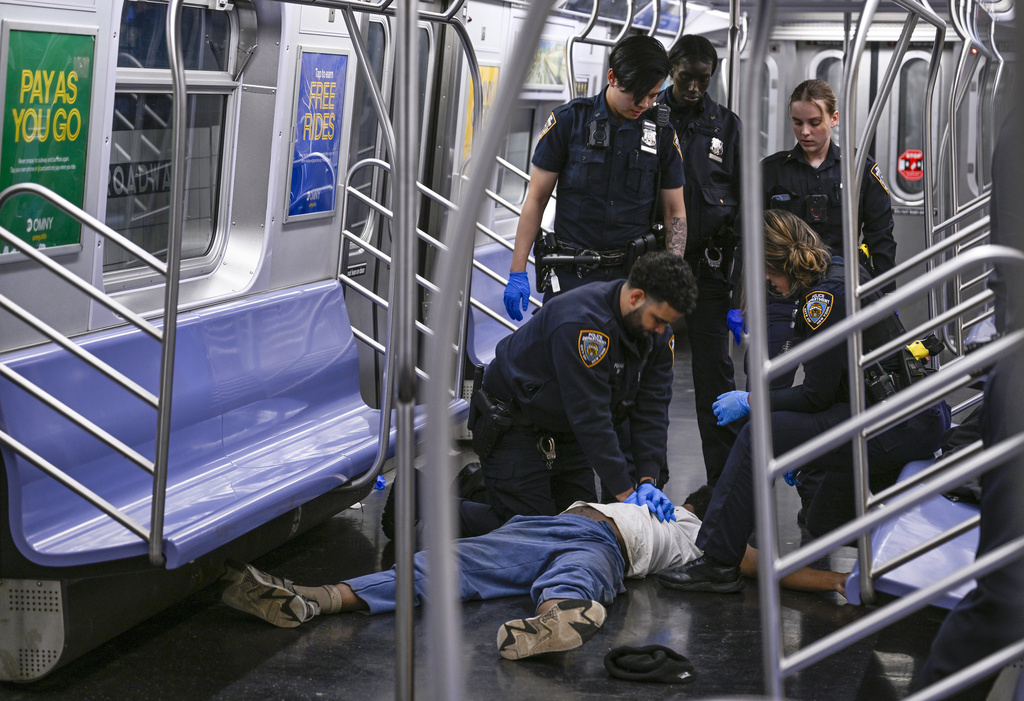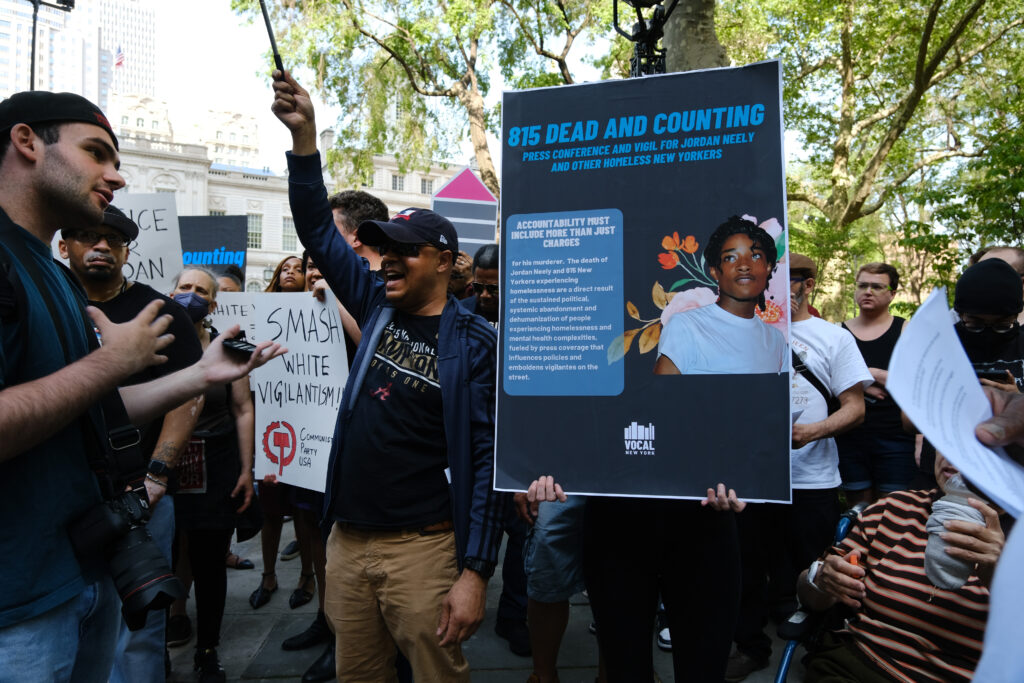Trial of Marine Daniel Penny, Charged in Subway Chokehold Death of Michael Jackson Impersonator Jordan Neely, To Begin With Jury Selection
Mr. Penny claims he acted to defend himself and his fellow subway riders from deranged man making violent threats, while prosecutors accuse the defense of victim-blaming and say Mr. Penny used excessive force.

Jury selection is set to begin on Monday at Manhattan criminal court in the trial against the Marine, Daniel Penny, who is accused of killing a homeless street performer, Jordan Neely, after he put him in a chokehold on the New York City subway in May 2023.
Mr. Penny, a 25 year-old former infantry squad leader from West Islip, Long Island, has pleaded not guilty to second degree manslaughter and negligent homicide. Combined, these two separate charges carry a maximum of nineteen years in prison, though prosecutors have not made any statements regarding the penalty they seek for Mr. Penny.
The case has sparked controversy and discussions about urban crime, especially crimes committed on the subway in a city where the subway is an essential means of transportations for millions of people. Violent crime on the subway has surged, according to the New York Post, since the COVID epidemic began. City and state officials have dispatched officers into the subways to try to clear out mentally ill homeless people living there, after a series of shocking crimes.
The racially charged case, as described by numerous media outlets, because Mr. Penny is white and Neely was Black, has been the source of public protests on behalf of the defendant and the victim.

The New York judge, who presides over Mr. Penny’s case, Maxwell Wiley, said during pre-trial hearings in early October that jury selection could last up to two weeks. He denied several motions submitted by the defense to suppress evidence, including video footage of Mr. Penny’s statements recorded by the New York Police department after the tragic incident.
Neely, who was 30 years old at the time of his death and known for his Michael Jackson impersonations, entered the F-train at the Second Avenue stop at downtown Manhattan on May 1, 2023 in the early afternoon. He had a long history of mental illness, homelessness and a criminal record with 42 arrests, including for drugs, disorderly conduct, petty larceny, and jumping subway turnstiles. According to witnesses, he was irate when he entered the subway car and threw his jacket on the ground, yelling that he was “fed up” and that he didn’t “mind going to jail and getting life in prison.” Neely also said, “I’m ready to die.”
A Spanish freelance journalist, Juan Alberto Vazquez, recorded a video on his phone, which went viral afterwards, that shows Mr. Penny holding Neely on the ground of the train car in a chokehold as Neely tried to break free by kicking his legs and moving his arms. Two other passengers helped restrain Neely, while Mr. Penny kept the chokehold around his neck.
A first responder, who testified at the pretrial hearing on October 3, said it “seemed like” Neely was still breathing, when he arrived at the scene and that he still had a pulse when he first treated him. Neely was then taken to the hospital, where he was pronounced dead. The city medical examiner’s office ruled Neely’s death a homicide two days later.

New York police officers took Mr. Penny to the precinct for questioning, where he told the officers he was trying to protect himself and his fellow subway passengers from what a witness describes as an “insanely threatening” aggressor. He was released the same day.
During the pretrial hearings in early October, prosecutors and defense attorneys argued whether or not the videos NYPD officers recorded of Mr. Penny answering questions at the scene and later at the precinct could be used during trial.
The video, where detectives questioned Mr. Penny at the 5th precinct in Chinatown, shows the former marine explaining in a composed manner that he was “not trying to kill the guy,” he was “just trying to deescalate the situation.”
“This guy was actually threatening. He said he wanted to go to prison forever,” Mr. Penny said. He also twice demonstrated the grip he had around Neely’s neck and told the detectives that he had wrapped his legs around Neely after “he starts to squirm, I hold him a little tighter.”

Prosecutors also want to use body-worn cameras from the responding officers that show Mr. Penny being asked if Neely carried a gun. Mr. Penny answered, “I don’t know, I just put him out.”
The district attorney’s office told the judge that the jury should see Mr. Penny’s first reactions and comments, while defense attorneys said their client was being treated as a witness at the time. Mr. Penny was initially released and not charged until ten days later.
Mr. Penny’s release sparked an uproar among racial justice advocates demanding retribution for Neely’s death. The video footage recorded by the Spanish journalist triggered city-wide demonstrations, including protesters who jumped onto the train tracks and blocked incoming trains at the Broadway-Lafayette subway station, underneath downtown Manhattan, where Neely had died. Many New Yorkers demanded Penny’s arrest.
To counter the protests demanding punishment for Mr. Penny and justice for Neely, supporters of Mr. Penny from Long Island, including the powerful Nassau County executive, demonstrated in his favor at Collect Pond Park.

Ten days after the incident, the Manhattan district attorney, Alvin Bragg, charged Mr. Penny. Some commentators said the delay between Mr. Penny being released and his being charged shows that Mr. Bragg succumbed to public pressure by charging Mr. Penny. But the district attorney stated his office needed time to review the video footage and speak to witnesses before the evidence led prosecutors to accuse the former marine of second degree manslaughter.
Mr. Penny turned himself in. Defense attorneys told the judge during the arraignment that he has strong ties to New York City, that he’s attending a four-year college in pursuit of a bachelor’s degree in architecture, and he enlisted in the Marine Corps when he was teenager, spending four years there before being honorably discharged. Defense attorneys added that Mr. Penny earned multiple medals and ribbons for good conduct while serving. The judge released Mr. Penny on $100,000 cash bail and ordered him to turn over his passport, and not to leave the state.
At trial, the prosecution will not have to prove that Mr. Penny intended to kill Neely. Instead it has to convince the jury that Mr. Penny was “reckless” when he held Neely in the chokehold that caused his death. Prosecutors have said that Mr. Penny held Neely “well past the point at which Neely had stopped purposeful movement.”
The amount of time, an alleged six minutes, Mr. Penny kept his arms around Neely’s neck will play an essential factor in their argument.

“The notion that death is not a foreseeable consequence of squeezing someone’s neck for six minutes is beyond the pale,” the district attorney’s office wrote in a court filing.
Another argument the prosecution has raised is that Mr. Penny, having been trained in the army, should have known that chokeholds can be deadly. The New York Post reported that a Marine trainer “told the grand jury that Marines are taught that chokeholds — which are meant to be a ‘non-lethal’ restraint — can sometimes be fatal.”
Mr. Penny’s defense attorneys, Thomas Kenniff and Steven Raiser, who asked the judge to dismiss the case last year, have argued that Mr. Penny acted in self-defense, intending to protect himself and his fellow subway passengers from an unpredictably dangerous Neely. Furthermore, they question if the chokehold was in fact what killed Neely and suggest his drug use may have been a factor.
In an October 2023 motion, the New York Post further reports, defense attorneys wrote that the medical examiner never gave the grand jury “any specific evidence that Neely had died from asphyxiation due to the chokehold.”

“Neely’s toxicology reports confirmed he had K2 in his system when he died,” the article states. “But the report didn’t say how much was present.”
K2 is a synthetic drug also known as spice. According to the Drug Enforcement Administration (DEA), American Addiction Centers writes, “K2 stays in a person’s system for a long time… Individuals who have taken K2 have exhibited serious short-term symptoms and problems, including violent behavior” and “suicidal tendencies.”
The case has divided the public. Mr. Penny’s supporters call him a hero who risked his own life to protect other passengers, while social justice advocates say that Neely had not actually physically attacked anyone, and that he was held for too long in an unnecessarily forceful chokehold.
Several witnesses, who were in the subway car on that fateful day, are expected to testify according to court filings, as well as police officers who first arrived on the scene, detectives who interrogated Mr. Penny, and representatives from the city’s medical office that ruled the death a homicide. Both sides will probably call their own psychological experts.
The trial is expected to last about six weeks.

